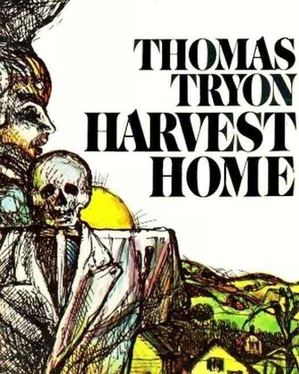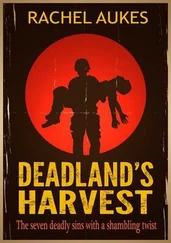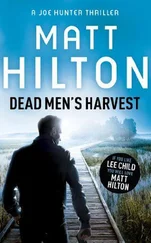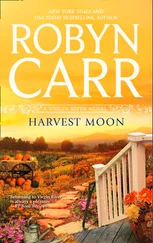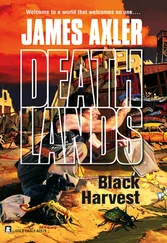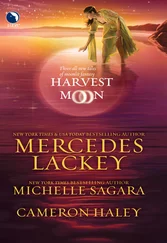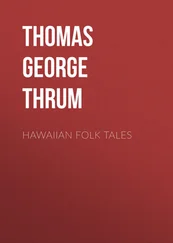Suddenly, distant shotgun fire reverberated through the trees, a series of muffled detonations. “Devils,” the Widow muttered. “There’s your Soakeses, over t’the river. Killin’. You a hunter? No? Good. Too many hunters.”
Now she uttered a little excited cry and dashed ahead of me. When I caught up with her, she was standing beside a large tree and looking down where, close to the base, grew a ring of mushrooms that had sprung up through the ground covering. She quickly knelt and began breaking the stems at the base and handing them to me. I examined one: though it was handsome, it certainly looked like the most poisonous thing nature could provide. The cap was about four inches across, a brilliant red, with small, warty bumps on it. The surface felt sticky, and bits of pine needles had adhered. The stem was white and pulpy-feeling, and the gills on the underside were a delicate formation of pale white. I had never seen the old woman so excited; her face was flushed from her exertions as she demolished the ring little by little. Then she carefully wrapped each mushroom in a piece of tinfoil. When she had finished, she gave me her hand and I helped her to her feet.
“There,” she exclaimed with pleasure, dusting her dress and handing me the basket to carry. “I knew we’d find some fly today, if we persevered.”
“Fly?”
“Those,” pointing to the mushrooms, “are fly agaric.” They were called “fly,” she explained, because they were once used to kill flies and other insects. If it would kill flies, how about humans? I asked. She laughed.
“I expect it could, you eat enough of them. Or at least they’d make a body mighty sick.”
“What do you use them for?”
“A woman always thinks it takes two to keep a secret, but I’m here to say I think it takes one.” She touched my arm and we proceeded back along the way we had come. At one point, we passed a spot where some more mushrooms grew; she pointed them out but scorned touching them. “Now there’s some little mites that only a fool’d touch.” Small and white, with dome-shaped caps, these were known as the Destroying Angel, and were deserving of their name. As for the red-topped beauties in the basket-those, she hastened to say, properly used could cure chilblains or, as in the case of Ferris Ott’s father, to halt his attacks of St. Vitus’ dance; Farmer Ott had had to miss church four Sundays in a row. “You and Beth are gettin’ to be quite the churchgoers,” she observed as we walked along. I said we were finding it pleasant, that I hadn’t been to church since I was a boy, and as for Beth-
She laughed. “She told me she’s a nonbeliever. Still, nonbelievers can become believers.”
“Old dogs and new tricks?”
“Why not?”
“I think Beth believes only in what she knows for sure to be true.”
The widow had been searching about her as we went along, now stopping to peer intently around a clump of ferns, now upon the ground. “What is truth?” she demanded finally.
“That which exists.”
“Many things exist. Things beyond-”
“The ken of man?”
“And others even within his ken. Depends on how broad a ken a pusson’s got.” She gave the word “ken” an emphasis that caused me to pay closer attention. “Here in this village, in this little place where folks seldom go beyond its boundaries, they tell themselves they understand the world and life. Coming from the city, you perhaps understand more.”
“Possibly.”
“But not all.” Her next question startled me. “You believe in the psychics?”
“Like Missy Penrose?”
“Missy, and other-”
“Phenomena? It’s possible.”
“Phenomena can be realized, too. By those who-seek.” Again the little snick of emphasis. “Take yourself, now. You’re a man of perception. Seein’s not necessarily believin’. There’s many kinds of reality, y’know. Many kinds o’ things.” She seemed to be leading the conversation, as if making some subtle probe of my nature. “It’s a matter of understandin’ things that maybe seem impossible to understand.”
“How?”
“By a pusson openin’ himself up to the possibility.” Again she shot me a look to see how I was absorbing this.
“How would a person do that?”
“There are ways.”
“Would you show a person?”
The familiar twinkle behind the glasses. “What makes you think I could?”
It was my turn to shoot her a look. “I think you could.”
She laughed and gave me a thump on the back. “Flattery’s a poisoned gift, they say.” She brushed some strands of cobweb from her skirts where her scissors usually hung. I pricked up my ears at her next words. “Still,” she said in a barely audible tone, “an ‘experience’ might be arranged.”
“How’s that?”
“I said an ‘experience.’”
“When?” My response was too eager, too forthright. I suddenly realized we were dealing in subtleties. Again she used her glasses lorgnette-style to peruse the ground carefully.
“Who knows?” she said at last. “A pusson mustn’t go too fast. The sphinx in Egypt’s been there a long time but no one’s solved its riddle yet. Not even the great Napoleon. ‘Course, some folks is smarter than others. If they was presented with a sphinx, they might be able to solve the riddle.”
“They?”
“ They .”
“Me?”
“Maybe.” She replaced her glasses and her glance was mischievous as she picked up her skirts and went by me. “A man must learn to discover what is possible.”
“Would that be the ‘experience’?”
“You got too many questions.” I could hear the humor in her voice. “Come along.”
The next few days brought more intermittent rain followed by a cold snap. We turned the heat on for the first time since our occupancy, and steam clanked through the labyrinthine pipes, rattling the radiators in furious bursts of energy, but producing little heat. The thermostat, of ancient vintage, was found to be defective, and I called a heating crew from over on the turnpike, asking them to replace it with a new one. Meanwhile we used the fireplaces. These proved to be defective as well, for in each room-the living room, the bacchante room, and our bedroom-more smoke seemed to come down the flue than went up.
Clearly what was needed was Jack Stump, whom I remembered hearing brag that he was handy in the matter of chimneys. He was long overdue to have returned, and I biked down the River Road to the bait shack where he lived.
Jack Stump had never claimed the virtues of homemaker, and his poor dwelling appeared to be in the same sorry state as when he had first taken tenancy back in March, after the spring floods. I could see a watermark girdling the battened sides about halfway up, and I wondered why the shack hadn’t been carried away altogether. The lawn was weeds, with cans and other debris scattered everywhere. At one side was a windowless shed where he probably stowed his rig, but the door was padlocked when I investigated. I knocked at the shack door, and got no reply. I knocked again, then called; still no reply.
I would have to tackle the chimneys myself. I turned my bike around and pedaled back up the road, pulling over to the side as a red Volkswagen came toward me from the other direction. I recognized Jim Minerva, who waved as he passed. What was he doing down on the River Road when he should be working at the grocery store? Playing hooky, maybe, and getting in a bit of fishing.
Driving back along Main Street, I saw Tamar Penrose in the doorway of the post office. She was holding a cat in her arms, and she watched me sullenly as she cradled the animal against her shoulders, her red nails running through the fur like so many red beetles.
Читать дальше
